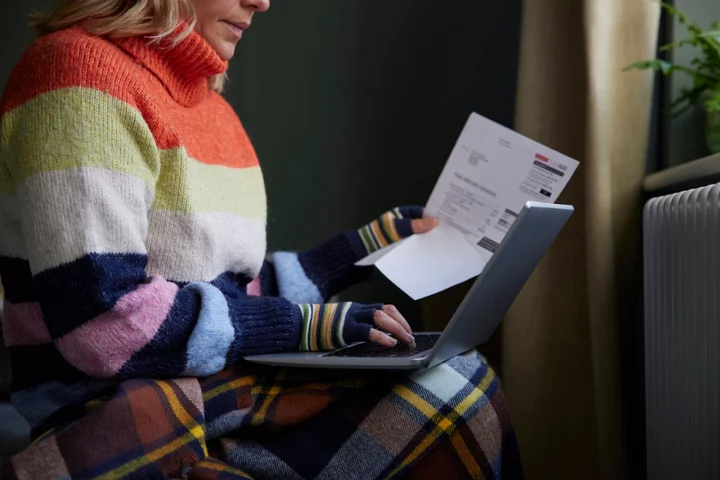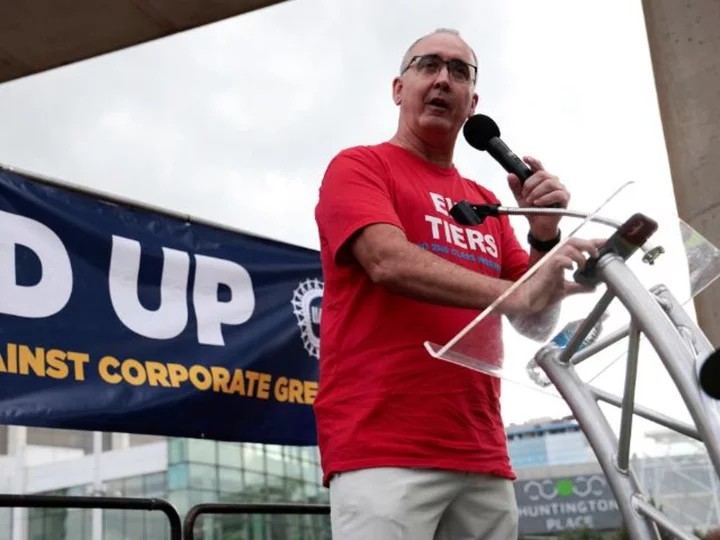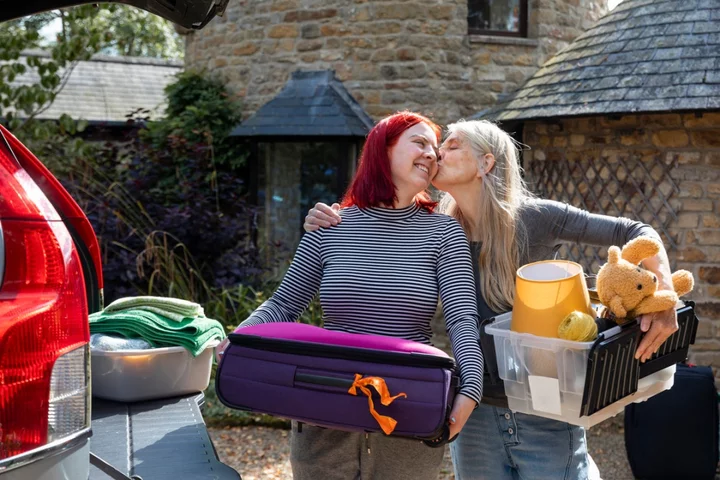
H&M starts charging shoppers £1.99 for online returns
High street fashion retailer H&M has joined other companies in charging shoppers who return items purchased online. Customers must now pay £1.99 to return parcels either in store or online, with the cost of the return being deducted from their refund. Rival high street stores including Zara, Boohoo, Uniqlo and Next already charge for online returns, with retail experts predicting that even more are likely to follow suit. During the pandemic, when online shopping inevitably soared in popularity, customers became increasingly more reliant on returning items when they did not fit. However, this also led to a rise in people buying items in bulk and returning almost all those items, some of them worn. While most online and high street retailers do not formally announce the move to charge for returns, many have introduced the change under the radar, with H&M implementing the return fee this summer. Business analysts have told the BBC that other retailers are likely to do the same. "It’s interesting that companies seem to be doing it by stealth, but it’s a sensible thing to be doing," retail expert Jonathan De Mello told the outlet. "It makes economic sense, as it discourages shoppers from bulk buying online products and then returning the majority of them. That’s been a real problem for companies." While H&M shoppers might be disappointed in the extra returns fee, added De Mello, most might understand why a company would need to make this decision, especially when it comes to the environment. Many shoppers are increasingly aware of the environmental impact of deliveries and returns, from courier vans to wasted packaging. Retail expert and analyst Natalie Berg wrote on Twitter/X that retailers have “created a monster” with free returns. “​​H&M charging for returns. Retailers have created a monster with free returns. It makes financial and environmental sense to put an end to this ‘buy to try’ mentality.” But Berg pointed out that customers who have signed up to H&M membership would be exempt from the extra fee for returning items. “This is actually a really delicate way to tier your customers,” Berg said of the membership scheme. “Slowly climb down from costly promises by limiting those benefits to loyalty members. Retailers have become too generous over the past decade. Save that generosity for your most valuable customers.” Read More Inside London’s first Vogue World: Thong leotards and Anna Wintour’s VIP assembly line Voguewashing London Fashion Week won’t pay the wages of Britain’s young fashion designers Bridesmaid who “didn’t love” her dress spends 35 years wearing it around the world Meghan Markle praised for mixing high-fashion with affordable pieces Vogue World wowed but won’t pay the wages of young fashion designers Ukrainian designers prove beauty can come from darkness at London Fashion Week
1970-01-01 08:00

Travis Hunter reveals details of scary injury that landed him in hospital
Colorado star Travis Hunter has opened up about his horrific incident in the game against Colorado State.
1970-01-01 08:00

Brits struggle with mental health due to cost of living crisis
People in Edinburgh, Leicester and Glasgow are struggling the most with their mental health - due to the cost of living crisis. A poll of 2,000 adults found 27 per cent have really taken a hit when it comes to their wellbeing, because of a lack of finances. Newcastle, London and Leeds are other key cities where people are most affected. Cutting down on socialising, gym memberships and nutritious food to save money are reasons why so many feel disheartened and worried about their mental wellbeing. And 40 per cent are dreading the winter as they are unsure if they will be able to afford energy bills to heat their home. The survey was commissioned by British Gas, which is working with Professor Green to raise awareness of the struggles so many are facing and highlight the free support available in the new phase of the British Gas Post Office Pop-Ups. The musician and mental health advocate said: “As a parent your first instinct is to protect and provide, and when you’re doing everything you can, and that’s still not enough, it has a profound impact on your mental health. “Shame, stigma and fear can keep people from speaking up for help, but it’s the best thing you can do – for yourself, your family and your community. “Stress and anxiety breed in uncertainty so I really encourage you to visit a British Gas Post Office Pop-Up or contact the British Gas Energy Trust to help you gain confidence in, and control of, your future.“ The research found 14 per cent of adults are cutting back on how often they shower to lower their bills, and 21 per cent aren’t buying birthday gifts for loved ones. One in 20 (five per cent) say their kids are missing out on new toys. Just over half (55 per cent) believe their mental health would definitely improve if they were more financially stable. People in Manchester were found to be most likely to skip using heat or electricity to keep their homes warm. But those in Edinburgh were most likely to report that they have had issues with money that have led to incurring additional debt, like credit cards. Only 27 per cent of all adults polled via OnePoll are confident they are accessing all the benefits they may be entitled to when it comes to support with their energy bills. One in 10 also believe the rising cost of energy has caused them a great deal of additional stress. And 25 per cent baldly state they are expecting to struggle to pay their energy bills through the rest of the year. Nearly the same amount (24 per cent) said the current cost of living crisis has been just as bad for their mental health as the Covid-19 pandemic. British Gas Energy Trust CEO Jessica Taplin said: “Debt and money stresses are debilitating, which is why we are delighted to be offering money and energy advisors funded by us in Post Offices across the country. “Working with an artist like Professor Green can really help raise awareness, and let people know it’s good to talk about the things that are worrying them.” Read More Voguewashing London Fashion Week won’t pay the wages of Britain’s young fashion designers What is happening to local government finances and why are councils struggling? ‘School staff seeing more students who do not have enough dinner money’ Nearly a fifth of parents fear children will ignore health issues while at university How often should you wash your pyjamas? ‘My baby’s blue eyes drew praise – but their colour was a warning sign’
1970-01-01 08:00

UAW president has some harsh words for Trump
The head of the United Auto Workers union is publicly denouncing former President Donald Trump ahead of his visit next week to Detroit as part of a plea to current and former union members.
1970-01-01 08:00

Ukrainian designers prove beauty can come from darkness at London Fashion Week
A Ukrainian fashion designer said she will continue to “work no matter what”, after showing her latest collection at London Fashion Week (LFW). Nadya Dzyak was one of three designers showing their latest collections in a showcase dubbed ‘Ukrainian Fashion Week’. This is the second season Ukrainian Fashion Week has taken place in London, as the traditional Kyiv-based event has been cancelled due to the ongoing Russian invasion. The show took place on the final day of LFW. It began with a voiceover saying: “Creating collections is our resistance to war”, going on to highlight that the fashion is a manifestation of “our strength and resilience”. “No matter what, we work. We’ll work because it’s our life and it’s our fight, to create new pieces,” Dzyak told the PA news agency backstage after the show. She said it was particularly meaningful participating in London Fashion Week, calling the city “the main centre of the world of fashion”. She said: “You cannot imagine how it’s important for us – it’s very strong, it gives power, it gives a lot of emotions.” Dzyak founded her eponymous brand in 2008, and her spring/summer 2024 collection was full of bright colours with sheer dresses laden with ruffles and frills. She said she was inspired by Ukrainian artist Polina Raiko, who was part of the naïve or folk art movement and died in 2004. Raiko’s museum house in Oleshky was flooded after the Russian destruction of the Kakhovka Dam earlier this year. “I was inspired by her drawings on the walls from this building,” Dzyak said, likening her design process to “painting with ruffles”. She continued: “This collection is about hope, about kindness, about optimism, about belief in lightness and victory. You can see very bright colours – for me, it’s something very beautiful.” The designer brought her bright colours to unconventional denim looks, which were dyed on the porch of her parents’ house. “My father helped me hand-dye clothes and dry them in the sun. There was something archaic, almost ritualistic in this process,” Dzyak said in a statement. “It made me reflect again on how we will carry the metaphysics of our heritage into the future, everyday life, traditions, parental love.” Also showing her latest collection was Elena Reva, who founded Elenareva in Kyiv in 2012. Her aesthetic was much more pared-back, with a muted colour palette on romantic gowns and structured tailoring. She was inspired by ancient Trypillian culture, which had a powerful cult dedicated to the Mother Goddess. Reva told the PA news agency backstage that the jewellery in the collection was designed to give “power and energy, because we need the power now”. She added: “It’s a very difficult situation in our country – it’s terrible. [But] we have to continue our jobs. We have to live… But it’s terrible when the rockets come in.” Her collection mixed masculine tailoring with feminine silhouettes, and created silver pendants of artifacts like amphora – made to look like items unearthed by modern archaeologists. Kseniaschnaider – the Kyiv-based brand founded in 2011 by married couple Ksenia and Anton Schnaider – was also on the runway. Denim dominated the collection in different forms, from patchwork jeans to distressed jackets. One of the models wore a denim interpretation of Cossack styles. All of the garments were made in Ukraine, with the brand adopting sustainable materials – such as aged-look denim dyed with a recycled finish made by cork stoppers. Kseniaschnaider launched the second drop of its collaboration with Adidas Originals during the show, including football tops in geometric patterns and a midi-length dress in Ukraine’s yellow, white and blue colours. At the end of the show, Dzyak, Reva and Schnaider walked down the runway with Ukrainian flags draped around their shoulders. Dzyak wants the world to know that Ukrainian designers are “very talented, very strong, very brave and very optimistic”. Reva added that it’s crucial for the world to see Ukrainian fashion, saying: “We have to tell about our culture, it’s very important. “We have a very strong community in Ukraine, and we have a very interesting story. And that’s why we have to continue.” Read More Charity boss speaks out over ‘traumatic’ encounter with royal aide Ukraine war’s heaviest fight rages in east - follow live Beginner’s guide to buying second-hand furniture Do I need to treat my garden furniture before storing it for winter? Prince William heads to New York for UN General Assembly climate week event
1970-01-01 08:00

Nearly a fifth of parents fear children will ignore health issues while at university
Nearly a fifth of parents fear their teenager will ignore a health issue while at university, as many self-diagnose on Google, research has found. Just 13 per cent of the 2,000 parents polled think their son or daughter would consult a proper doctor as soon as they feel unwell. More than one in 10 (12 per cent) think their offspring would be too lazy to seek medical attention, and 11 per cent fear they do not make their health a priority. The study of parents whose children either attend university, have done in the past or plan to soon, by Bupa Family+, also found that many (53 per cent) said their child thinks they are ‘invincible’ and nothing bad will ever happen to them. And as thousands of students prepare to start university, 56 per cent of parents feel excited for their child while 41 per cent are anxious. Dr Naveen Puri, GP and spokesperson for Bupa Family+, which commissioned the research to support the launch of its Family+ insurance proposition built around savings on health insurance for families, said: “All parents worry about their children, whatever their age. “But it can be especially difficult when they move out for the first time and become more independent – and you are no longer nearby to help them. “As a child and even a young adult, when you are unwell or have a health issue, your parents are often your first port of call, or even the ones spotting something is wrong in the first place. “They are usually the ones pointing you in the right direction, sorting appointments and arranging medication you might need. “Moving out or going to university is both an exciting and daunting time for all the family and we hope our new Family+ cover, which also insures older children, will help provide peace of mind to parents and their children alike.” It also emerged that parents’ top fears for their children as they embark on life away from the family home include their financial situation (44 per cent), their mental health (43 per cent), and whether they will be lonely (43 per cent). Others worry about who they will be spending time with (31 per cent), if they’ll know how to look after themselves (32 per cent) and what they’ll do when they feel unwell (23 per cent). And 64 per cent of those who have a child who has already left home admitted they have even lost sleep worrying about them. It emerged that 55 per cent think they would still be the first port of call for help or advice if their child felt unwell despite no longer living under the same roof. Ahead of them moving out, 63 per cent of parents will teach them how to manage their finances, while 59 per cent give tips on how to cook healthy meals. Others show their child how to use a washing machine (56 per cent), how to drink responsibly (40 per cent) and how to deal with mental health concerns (43 per cent). The study, carried out via OnePoll, also revealed girls are considered more likely to take care of their physical (43 per cent) and mental (41 per cent) health than boys (13 per cent and 11 per cent). Dr Naveen Puri, GP and spokesperson for Bupa Family+ said: “Our health is so important, and it can be worrying for parents that their child may be unwell when they aren’t there to help. “Making sure they have the knowledge about what to do in different health situations is a great way of not only ensuring they can look after themselves but also allows you to relax a little knowing they have the tools they need.” Here are the top reasons why parents worry their child would ignore health issues: 1. Googling and self-diagnosing 2. Being too lazy 3. Health is not a priority 4. Embarrassed to talk about their health 5. Worried a GP would judge them Read More ‘It can be hard when your kids leave the nest,’ mother says as study finds parents want their children back How to cope with anxiety during university How often should you wash your pyjamas? ‘My baby’s blue eyes drew praise – but their colour was a warning sign’ Brits get itchy feet in their home after five years, study finds
1970-01-01 08:00

TPG explores sale of restaurant chain Mendocino Farms -sources
By Abigail Summerville NEW YORK Private equity firm TPG Inc is exploring options for Mendocino Farms, including a
1970-01-01 08:00

New NFL Promos: Bet $10 on Week 3, Win up to $550 in Bonus Bets at DraftKings and FanDuel
Make the most of this new NFL season with these limited-time offers at DraftKings and FanDuel. Read more to learn how you can become a guaranteed winner today.
1970-01-01 08:00

Fantasy Football Week 3: Start 'Em, Sit 'Em
Breaking down the top start 'em, sit 'em decisions for Week 3 of the fantasy football season.
1970-01-01 08:00

The Rolling Stones have nearly finished a follow-up album to Hackney Diamonds
'Hackney Diamonds' is not the last Rolling Stones record, insists Sir Mick Jagger.
1970-01-01 08:00

Angelique Cabral lends voice to Disney animation Wish
Angelique Cabral is to voice the character of Queen Amaya in the new Disney animated movie 'Wish'.
1970-01-01 08:00

How often should you wash your pyjamas?
We all have our favourite pair of PJs we come back to – time after time. Some of us may even have special pyjamas for lounging around in and feeling comfy when snuggled up with Netflix on the sofa. But because they’re only worn inside the house and for sleeping (well, most of the time), the rules can seem different when it comes to PJ maintenance. So, how often should we be washing them and switching to a clean pair? Do you need to wash your pyjamas daily? “You might be surprised to know the answer is no!” says cleaning and laundry expert Laura Mountford, author of Live, Laugh, Laundry. “Like all of our clothing, many of us may be guilty of washing our pyjamas too frequently, or perhaps not enough. But in reality, pyjamas should be washed after every two or three wears. Washing them after every wear, unless they are actually stained, smelly or sweaty, is unnecessary – a waste of money, water and energy,” Mountford adds. She suggests pyjamas can be left to air between wears, and this should be sufficient for them to freshen up ready for the next night – so putting them under your pillow probably isn’t the best idea. Should you wash them more in the summer? “I wash my pyjamas more in the summer when the nights are hot,” says Mountford, “as sweat can cause bacteria growth, which will make them smell. And nobody wants to snuggle into bed in sweaty pyjamas, do they?” What’s the most hygienic way to wash your pyjamas? Sophie Lane, product training manager at Miele GB, says: “Wash pyjamas at the highest temperature the fabric can cope with – check the garment care label. This will deliver the most hygienic clean. Detergent is also important to achieving good results.” Are different materials more or less hygienic? Natural fabrics like cotton are the most hygienic, suggests Mountford, as they are breathable, so bacteria and sweat builds up less quickly compared to manmade fabrics like polyester. Lane agrees, adding: “Cotton is also extremely durable and can withstand high temperature washes. Bamboo is another good fabric option for pyjamas. It’s very breathable whilst being effective at thermal regulating, to keep you warm in the winter and cool in the summer. It’s also anti-bacterial, hypo-allergenic and odour-resistant.” What happens if you don’t wash pyjamas regularly? Mountford says: “Most of us wear our pyjamas for eight hours each night, so not washing them frequently enough can cause bacteria to grow, making them smelly and unhygienic… not very cosy at all. This may reduce the quality of your sleep,” she adds – noting it could result in “skin irritation” too. Does it make a difference if you shower before bed or in the morning? “Showering before bed keeps your pyjamas and bedding fresher for longer, as you are jumping into bed with a clean body, having already removed the dirt, bacteria and allergens from the day,” says Mountford. “Not showering before bed will cause these particles to be transferred onto your nightwear and bedding, which will cause them to get dirty and smelly more quickly.” Read More Charity boss speaks out over ‘traumatic’ encounter with royal aide Ukraine war’s heaviest fight rages in east - follow live Beginner’s guide to buying second-hand furniture These are the best shorter daffodils to plant now for spring – according to RHS trials Do I need to treat my garden furniture before storing it for winter?
1970-01-01 08:00
